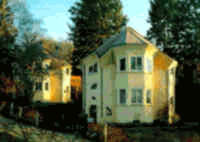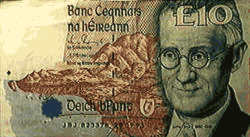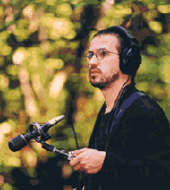He coined the word "xenocrony," or strange synchronization, to describe his organizational principle of matching different parts of different concerts to create an entirely new musical statement.
--LOS ANGELES (Dec. 6 1993) UPI (wire article on death of Frank Zappa)
[^]
From: Wordsmith Sent: Sunday, June 04, 2000 12:13 AM Subject: A.Word.A.Day--auscultation auscultation (o-skuhl-TAY-shuhn) noun 1. The act of listening. 2. The act of listening for sounds made by internal organs, as the heart and lungs, to aid in the diagnosis of certain disorders. [Latin auscultatio, auscultation-, from auscultatus, past participle of auscultare, to listen to.] "Chest auscultation with a stethoscope will help detect any heart murmurs or harshness of the lungs." D.V.M. Ronald Ulfohn, Check Out That laid-Back Lab, Seattle Post-Intelligencer, Jan 22, 2000. Pronunciation: wordsmith.org/words/auscultation.ram
[^]
Main Entry: eu-ryth-my

Three eurythmics buildings (1920/21), used to house members of the Goetheanum theater, especially for the eurythmic performances (Univ. of South Wales; architect Rudolf Steiner).
Variant(s): or eu-rhyth-my /yu-'ri[th]--mE/
Function: noun
Etymology: German Eurhythmie, from Latin eurythmia rhythmical movement, from Greek, from eurythmos rhythmical, from eu- + rhythmos rhythm
Date: 1949
: a system of harmonious body movement to the rhythm of spoken words
--Merriam-Webster Dictionary
[^]
every 5 seconds siege cannons gutting space with a chord ZANG-TUMB-TUUMB mutiny of 500 echos smashing scattering it to infinity. In the center of this hateful ZANG-TUMB-TUUMB area 50square kilometers leaping bursts lacerations fists rapid fire batteries. Violence ferocity regularity this deep bass scanning the strange shrill frantic crowds of the battle Fury breathless ears eyes nostrils open! load! fire! what a joy to hear to smell completely taratatata of the machine guns screaming a breathless under the stings slaps traak-traak whips pic-pac-pum-tumb weirdness leaps 200 meters range Far far in back of the orchestra pools muddying huffing goaded oxen wagons pluff-plaff horse action flic flac zing zing shaaack laughing whinnies the tiiinkling jiiingling tramping 3 Bulgarian battalions marching croooc- craaac [slowly] Shumi Maritza or Karvavena ZANG-TUMB-TUUUMB toc-toc-toc-toc [fast] crooc- craac [slowly] crys of officers slamming about like brass plates pan here paak there BUUUM ching chaak [very fast] cha-cha-cha-cha-chaak down there up around high up look out your head beautiful!
--Filippo Tommaso Marinetti, Zang Tumb Tumb, 1914
[^]
His mouthfull of ecstasy (for Shing-Yung-Thing in Shina from Yoruyume across the Timor Sea), herepong (maladventure !) shot pinging up through the errorooth of his wisdom (who thought him a Fonar all, feastking of shellies by googling Lovvey, regally freytherem, eagelly plumed, and wasbut gumboil owrithy prods wretched some horsery megee plods coffin acid odarkery pluds dense floppens mugurdy) as thought it had been zawhen intwo. Wholly sanguish blooded up disconvulsing the fixtures of his fizz. Apang which his tempory chewer med him a crazy chump of a Haveajube Sillayass. Joshua Croesus, son of Nunn! Though he shall live for millions of years a life of billions of years, from their roseaced glows to their violast lustres, he shall not forget that pucking Pugases. Holihowlsballs and bloody acres! Like gnawthing unheardth !

Deich bPunt, The Irish Ten-Pound note with Joyce's portrait, first issued in 1993.
--James Joyce, Finnegans Wake [2:8 228.9]
[^]
At first the art of music sought purity, limpidity and sweetness of sound. Then different sounds were amalgamated, care being taken, however, to caress the ear with gentle harmonies. Today music, as it becomes continually more complicated, strives to amalgamate the most dissonant, strange and harsh sounds. In this way we come ever closer to "noise-sound."
--Luigi Russolo, The Art of Noises
[^]
The Sharawadji effect is an aesthetic effect which characterises the sensation of plenitude sometimes created by the contemplation of a complex soundscape whose beauty is unexplainable. This exotic term, which travellers introduced to Europe in the 17th Century from their journeys to China, designates the beauty that comes about without perceiving the order or economy of the object in question. The effect comes about as a surprise and will carry you elsewhere, beyond strict representation - out of context. In this brutal confusion, the senses get lost. A beautiful Sharawadji plays with the rules of composition, manipulates them and awakens a feeling of pleasure through perceptual confusion.

Claude Schryer, composer, "À la recherche de l'effet Sharawadji..." (Searching for the Sharawadji effect).
Whether in a dreamlike or anxious state, we are sometimes completely deaf to the environment. However while on a walk or on a journey, our spirit can combine availability, attention, perspicacity and therefore become receptive to new things, including sonic fantasy.
The beautiful Sharawadji affirms itself in contrast with the banality from which it originates. Sharawadji sounds, as such, belong to everyday life or to known musical registers. They only become Sharawadji by decontextualisation, by a rupture of the senses. The sonic matter that encourages the Sharawadji effect is up to the appreciation of each individual, in a given context, however the soundscape, and in particular urban soundscapes can, as a result of their unpredictability and diversity, favour it. The sonic wealth of nature is also susceptible of creating the Sharawadji effect.
--Jean-François Augoyard and Henry Torgue, À l'écoute de l'environnement, répertoire des effets sonores (a dictionary of sound effects) , 1995 (translation, Claude Schryer)
[^]
|
corporation for public broadcasting |
national endowment for the arts |
hearing voices |